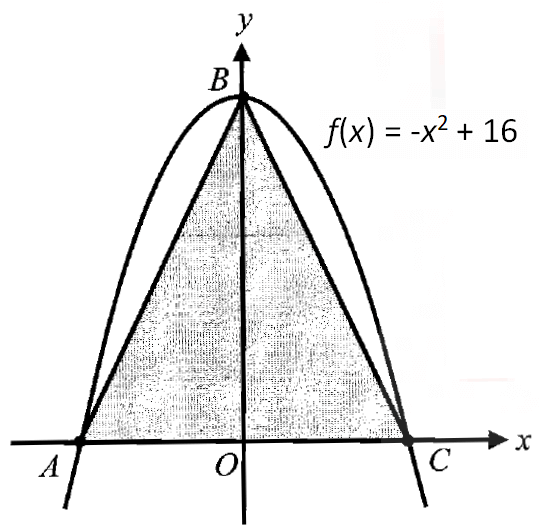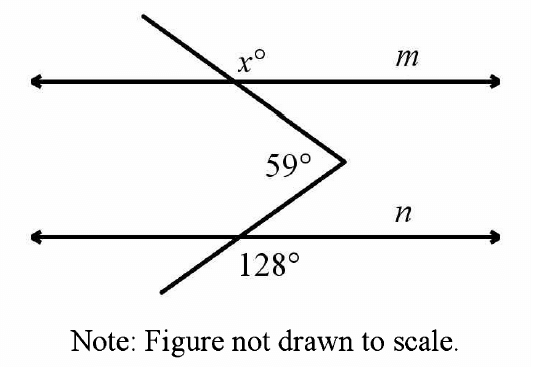SAT MATH QUESTIONS ON QUADRATIC EQUATIONS
Question 1 :
If x2 + 4x = 45 and x > 0, what is the value of (x + 2)?
Answer :
x2 + 4x = 45
Subtract 45 from both sides.
x2 + 4x = 45
Factor and solve for x.
(x + 9)(x - 5) = 0
x + 9 = 0 or x - 5 = 0
x = -9 or x = 5
Since x > 0, k = 5.
x + 2 = 5 + 2
x + 2 = 7
Question 2 :
Find the sum and product of the solutions to the following quadratic equation.
2x2 + 6x + 2 = 0
Answer :
2x2 + 6x + 2 = 0
Divide both sides by 2.
x2 + 3x + 1 = 0
Comparing
x2 + 3x + 1 = 0
and
ax2 + bx + c = 0
we get
a = 1, b = 3 and c = 1
Therefore,
sum of the roots = -b/a
= -3/1
= -3
product of the roots = c/a
= 1/1
= 1
Question 3 :
x2 - 5x + c = 0
In the quadratic equation above, c is a constant. In the equation has two solutions for x, one of which is -3, what is the value of the other solution?
Answer :
One of the roots of the quadratic equation is given, that is -3. Let k be the other root of the equation.
Comparing
x2 - 5x + c = 0
and
ax2 + bx + c = 0
we get
a = 1, b = -5 and c = c
Therefore,
sum of the roots = -b/a
= -(-5)/1
= 5
k + (-3) = 5
k - 3 = 5
Add 3 to both sides.
k = 8
So, the other solution is 8.
Question 4 :
If (x + 3)(x - 3) = 91, what is the value of x?
Answer :
(x + 3)(x - 3) = 91
x2 - 3x + 3x - 9 = 91
x2 - 9 = 91
Add 9 to both sides.
x2 = 100
Take square root on both sides.
√x2 = √100
x = ±10
Question 5 :
(x - a)(x - a - b) = 0
In the quadratic equation above, a and b are constants greater than zero. if 8 and 3 are two solutions to the equation, what is the value of b.
Answer :
(x - a)(x - a - b) = 0
x - a = 0 or x - a - b = 0
|
x - a = 0 Add a to both sides. x = a |
x - a - b = 0 Add a and b to both sides. x = a + b |
Given : 8 and 3 are two solutions (values of x) to the equation.
Assume a = 8 and a + b = 3.
Substitute a = 8 in a + b = 3.
8 + b = 3
Subtract 8 from both sides.
b = -5
Since b is a constant greater than zero, b = -5 can not be accepted.
Assume a = 3 and a + b = 8.
Substitute a = 3 in a + b = 8.
3 + b = 8
Subtract 3 from both sides.
b = 5
In b = 5, the value of b is greater than zero. So, the value of b is 5.
Question 6 :
2x2 - 10x + k = 0
The quadratic equation above, in which k is a constant has two solutions m and n. If m > n and m - n = 9, what is the value of n?
Answer :
Comparing
2x2 - 10x + k = 0
and
ax2 + bx + c = 0
we get
a = 2, b = -10 and c = k
Sum of the roots = -b/a
= -(-10)/2
= 5
Given : The two solutions of the quadratic equation are m and n.
m + n = 5 ----(1)
Given : m - n = 9.
m - n = 9 ----(2)
Add (1) and (2) to eliminate n and solve for m.
2m = 14
Divide both sides by 2.
m = 7
Substitute m = 7 in (1).
7 + n = 5
Subtract 7 from both sides.
n = -2
Question 7 :
9x2 + kx + 4 = 0
The quadratic equation above has two equal real roots, find the value of k.
Answer :
Comparing
9x2 + kx + 1 = 0
and
ax2 + bx + c = 0
we get
a = 9, b = k and c = 1
If the quadratic equation in the form ax2 + bx + c = 0 has two real roots, then the value of the discriminant b2 - 4ac is zero.
b2 - 4ac = 0
Substitute b = k, a = 9 and c = 1.
k2 - 4(9)(1) = 0
k2 - 36 = 0
Add 36 to both sides.
k2 = 36
Take square root on both sides.
√k2 = √36
k = ±6
Question 8 :
kx2 + 8x + 4 = 0
The quadratic equation above has two real roots, find the maximum possible value of k.
Answer :
Comparing
kx2 + 8x + 4 = 0
and
ax2 + bx + c = 0
we get
a = k, b = 8 and c = 4
If the quadratic equation in the form ax2 + bx + c = 0 has two real roots, then the value of the discriminant b2 - 4ac is greater than or equal to zero.
b2 - 4ac ≥ 0
Substitute b = 8, a = k and c = 4.
82 - 4(k)(4) ≥ 0
64 - 16k ≥ 0
Subtract 64 from both sides.
-16k ≥ -64
Divide both sides by -16.
k ≤ 4
k can be equal to 4 or less than 4.
Therefore, the maximum possible value for k is 4.
Kindly mail your feedback to v4formath@gmail.com
We always appreciate your feedback.
©All rights reserved. onlinemath4all.com
Recent Articles
-
Digital SAT Math Problems and Solutions (Part - 143)
Apr 13, 25 12:01 PM
Digital SAT Math Problems and Solutions (Part - 143) -
Quadratic Equation Problems with Solutions
Apr 12, 25 08:21 PM
Quadratic Equation Problems with Solutions -
Digital SAT Math Problems and Solutions (Part - 142)
Apr 11, 25 06:26 PM
Digital SAT Math Problems and Solutions (Part - 142)

